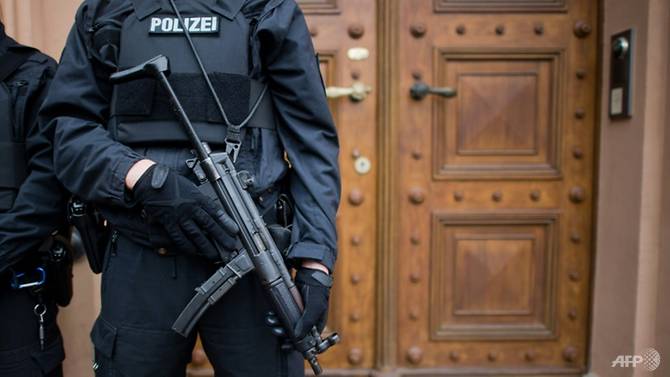German police arrest Syrian suspected of preparing terror attack
 |
| German police have arrested a Syrian man suspected of preparing a terror attack. (Photo: AFP/Julian Stratenschulte) |
The man, identified only as Yamen A, 19, was held at dawn by special forces in the northeastern town of Schwerin, the federal prosecutor's office said in a statement.
Several apartments were also searched in the region, which is north of Berlin.
The man is suspected of having "planned and already concretely prepared an Islamist-motivated attack in Germany using very powerful explosives," a spokeswoman for the prosecutor's office, Frauke Kohler, told reporters.
In a statement, the office said the man had made a decision "no later than July 2017 to explode a bomb in Germany with the aim of killing and wounding as many people as possible."
"It has not yet been established whether the suspect already had a target in mind or not," it said, adding that prosecutors did not have any information on whether the suspect belonged to "a terrorist organisation".
In the following weeks, he began to acquire the chemical products and materials necessary to build a bomb.
"A serious attack has been prevented," German Interior Minister Thomas de Maiziere said in a statement.
"This action came at exactly the right moment: late enough that the necessary evidence had been gathered but early enough to eliminate any potential danger".
He added: "The threat level in Germany remains high".
German police have been on high alert over potential extremist attacks, particularly since December last year when a man hijacked a truck and ploughed into shoppers at a Christmas market in Berlin, killing 12 people.
The attacker was shot dead by police in Milan four days later, and the rampage was claimed by the Islamic State militant group.
An investigation pointed to a catalogue of "gross mistakes" by security services in the lead-up to the attack.
'10,000 RADICALS'
The scathing report found that authorities had missed several opportunities to arrest and deport the driver, Tunisian asylum seeker Anis Amri.
The 24-year-old, who had previously been jailed in Italy, had been in touch with extremists and sold drugs in Berlin. He had managed to escape detection by skipping across German state lines and using different identities.
Last July, a 26-year-old Palestinian asylum seeker wielding a knife stormed into a supermarket in Hamburg, killing one person and wounding six others before being detained by passers-by.
German prosecutors said the man likely had a "radical Islamist" motive.
The intelligence services estimate there are around 10,000 radicals in Germany, some 1,600 of whom are suspected of being capable of using violence.
IS claimed responsibility for a number of other attacks in 2016, including the murder of a teenager in Hamburg, a suicide bombing in the southern city of Ansbach that wounded 15, and an axe attack on a train in Bavaria that left five injured.
Chancellor Angela Merkel has allowed in more than one million asylum seekers in the past two years - a decision that has driven the shock rise of the far-right Alternative for Germany (AfD) party.
The arrest on Tuesday came as Merkel's conservative CDU party was in talks with the left-leaning Greens and the pro-business Free Democrats (FDP) to form a coalition government.
One of the main points of friction in the talks is Germany's position on migrants, with the CDU and the FDP hoping to clamp down on new arrivals while the Greens want to maintain a more welcoming stance.
What the stars mean:
★ Poor ★ ★ Promising ★★★ Good ★★★★ Very good ★★★★★ Exceptional
Latest News
More News
- Russian President congratulates Vietnamese Party leader during phone talks (January 25, 2026 | 09:58)
- Worldwide congratulations underscore confidence in Vietnam’s 14th Party Congress (January 23, 2026 | 09:02)
- Political parties, organisations, int’l friends send congratulations to 14th National Party Congress (January 22, 2026 | 09:33)
- 14th National Party Congress: Japanese media highlight Vietnam’s growth targets (January 21, 2026 | 09:46)
- 14th National Party Congress: Driving force for Vietnam to continue renewal, innovation, breakthroughs (January 21, 2026 | 09:42)
- Vietnam remains spiritual support for progressive forces: Colombian party leader (January 21, 2026 | 08:00)
- Int'l media provides large coverage of 14th National Party Congress's first working day (January 20, 2026 | 09:09)
- Vietnamese firms win top honours at ASEAN Digital Awards (January 16, 2026 | 16:45)
- ASEAN Digital Ministers' Meeting opens in Hanoi (January 15, 2026 | 15:33)
- ASEAN economies move up the global chip value chain (December 09, 2025 | 13:32)
















 Mobile Version
Mobile Version